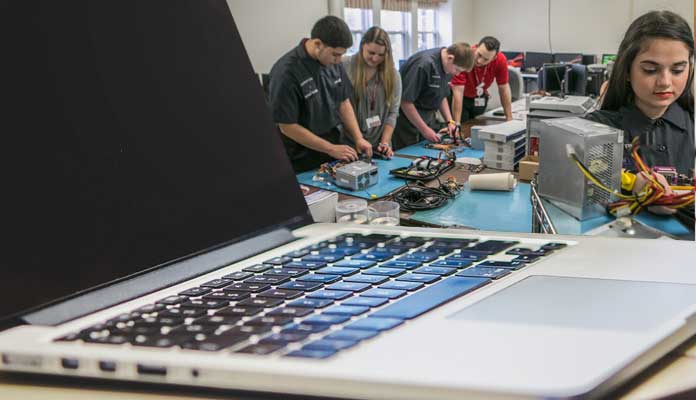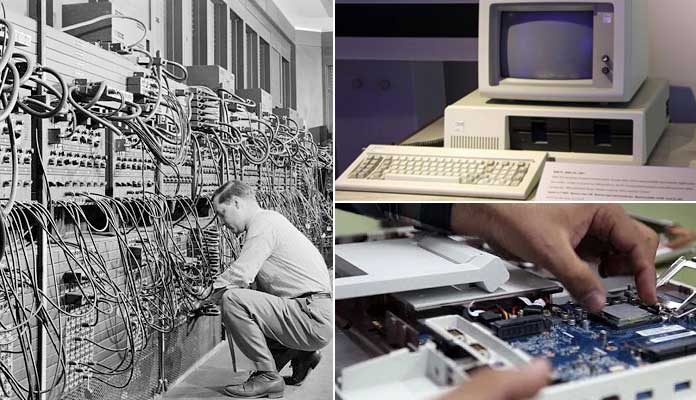The computer is probably one of the most versatile inventions of all times. It is increasingly affecting our lives. The world of science is a magical one, brimming with wonderful inventions and discoveries. In the chain of revolutionary scientific inventions, the computer is a remarkable addition. It’s unusual nature, and unique functions present yet another confirmatory test to prove that in today’s world, from womb to tomb, science plays a dominant role.
Man has made extraordinary progress in the world as a shelter less creature. Like several other scientific inventions, the computers are serving the humankind in multidimensional ways. The history of computer evolution tells us an interesting story.
Let us have a look the journey.
The abacus was the first digital device invented by Babylonians over four thousand years ago.
In 1642, Blaise Pascal invented Pascaline- creating a machine, which could only add.
In the eighteenth century, Leibniz developed mechanical calculator which could performs all the mathematical functions. However, their machines did not work very well.
During the 1940s, Howard Akin invented the first automatic digital computer, the MARK 1.
John Neuman presented two new ideas in a paper published in 1945 on computer designing. His paper helped develop computers faster than ever before.
There have been four generations of computers. All current computers are considered to be fourth generation machines.
First Generation
First generation computers were massive machines. By today’s standards, they were slow and prone to frequent breakdowns.
Second Generation
The second generation computers were made up of transistors instead of vacuum tubes.
Third & Fourth Generation
The third generation computers had integrated circuits or silicon chips instead of transistors. The use of chips allowed mini computers and microcomputer to be developed into the fourth generation. The fourth generation silicon chip can easily fit into the palm of the hand. Much of the work of fourth generation computers focuses on solving problems relating to natural language processing, artificial intelligence and VLSI (Very Large Scale Integration).
Fifth Generation
Expert systems are expected to benefit from fifth generation computer design. Supercomputers are also there, with the best ability to process large amounts of data. They are, however, very expensive, and used only in fields that need to analyze massive amounts of data, such as weather forecasting. There are several benefits of computer usage in fields like medical, education and science.
The 80s and Personal Computers

In the 1980s personal computers became affordable and easy to use. Many schools in the developed countries acquired computers to provide education to their students.
Benefits of Using Personal Computers
One of the advantages of using personal computers is that students can do great research work. Some programs, such as word processing, can be utilized by almost all businesses. These programs are also useful for maintaining routine business records. Computers can also create models to predict and plan for the future. Computer technology has also been used to assist the human body by providing computerized prostheses.
What are robot and robotics?
“A robot is an automatic computer controlled device, which respond to commands from a human by performing a physical action, that produces work. Robotics is a branch of computer technology which deals with the problems of constructing robots.”
Present technology robots can do multi-dimensional tasks. Robots and computers would also become more efficient if they could learn from their experiences.
The computer technicians and manufacturers present us with the modern machines that apply to guided missiles, deep space probes, spacecraft, and orbiting space stations.
An impressive contribution to the computer technology was made by Pakistani Brothers who invented a computer virus.
What is a Computer Virus?
It is a small but deadly program like a parasite that lurks in the darkest recesses of the computer waiting for an opportunity to spring to life. It is an electronic information disorder. The discovery of computer viruses has been named as artificial intelligence.
Eden Phillpots opined:
“The universe is full of magical things patiently waiting for our wits to grow sharper.”
And he was quite right in saying that because so far computer is one such magical thing.
Besides all these benefits there are some drawbacks of using the computer. These disadvantages include displacement and loss of privacy, cybercrime, and a leisure led lifestyle. Another drawback is technophobia, which means the fear of machines in general and computer technology in particular.
According to Sydney I. Harris view:
“The real danger is not that computers will begin to think like men, but the men will start to think like computers.”
On the whole, computer technology has more advantages than its disadvantages. Science has undoubtedly transformed our power over nature and our world outlook. Science made tremendous progress in the 20th century. Scientifics are of the view that the fifth generation computers would help the countries become superpowers. To get the best possible results and maximum benefits multiplication and proliferation of computers have been encouraged in the world.
Remember! Time and the world are always in a flight. We learn through error. Our failings pave the way for future success. We have to pave the way for our future achievements; we must not load our guns instead we need to decorate our country with the computers. The use of computers will help make our nation developed, powerful, self-reliant, prosperous and progressive. If the computer had not been invented, the people of the present age would have been far behind in the journey of the scientific revolution; rather they would have been science-less. Science-less! Yes of course science less and progress-wise, lifeless as well.
All opinions expressed here belong to the writer. HoursTV Team or any of its subsidiaries, sub-agents, partners or related third parties cannot be held directly or indirectly responsible for it.

Author - Asfia Imran
Asfia Imran is a student of MBA – Finance. She writes on Human Health Issues and wants to write content which would help others.


